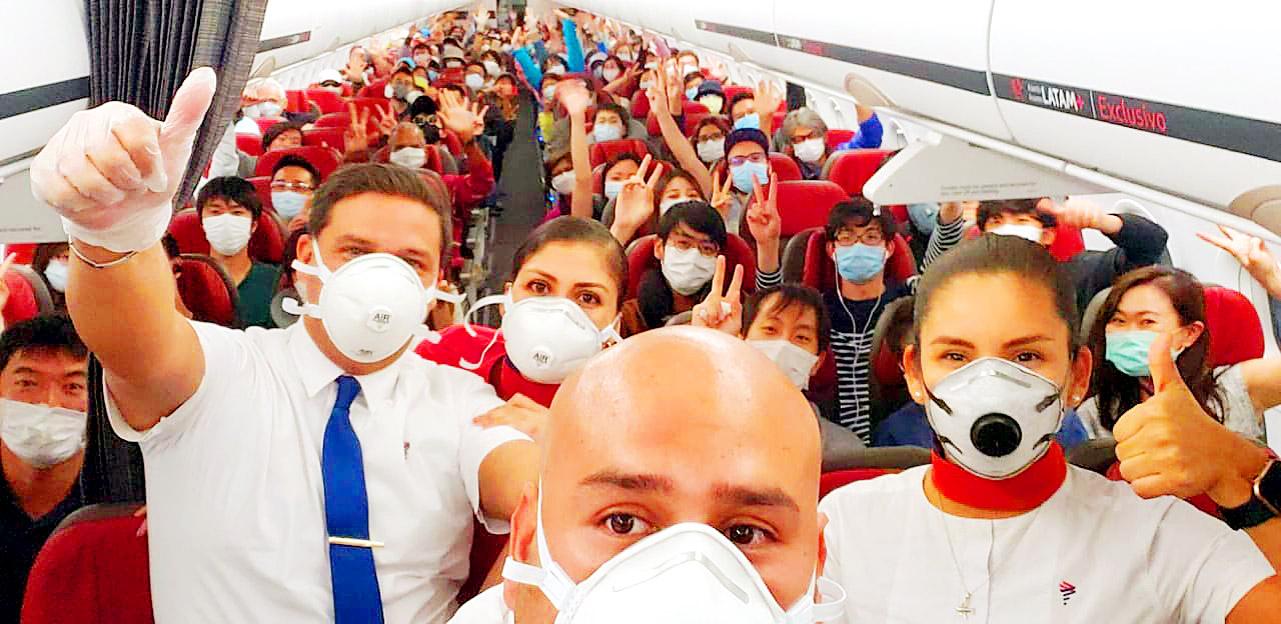A second chartered flight, arranged by the Taipei Economic and Cultural Office in Peru, brought 55 Taiwanese and 84 foreign nationals stranded in Peru to Miami yesterday morning Taipei time.
The Peruvian government closed its borders on March 16 due to fears over the spread of COVID-19, leaving more than 100 Taiwanese travelers stuck in the South American country.
The Ministry of Foreign Affairs coordinated the first chartered flight, which evacuated 72 Taiwanese to the US, as well as the second, the passengers of which included 55 Taiwanese, 34 Americans, 29 Japanese, 14 Singaporeans and seven Malaysians.

Photo courtesy of the Ministry of Foreign Affairs
As commercial service airports were closed in Peru, the chartered flight took off from a military air base.
As there were nearly 40 chartered airplanes awaiting approval to evacuate travelers, the Taipei Economic and Cultural Office in Peru said that it is grateful that the Peruvian government approved the two flights.
Taiwan was the third country that was allowed to evacuate its citizens from Peru, following the US and Mexico, an official from the Ministry of Foreign Affairs said.
As Peru is one of the most popular tourist destinations in South America, many foreign nationals were stranded when the nation closed its borders, so when Taiwan’s first chartered flight successfully took off, the ministry received many calls from other countries asking about other evacuation flights, the official said.
“As there were seats left in the second chartered flight, we were happy to cooperate with other countries,” the official said, adding that priority was given to Taiwanese.
The remaining seats were given to travelers from other countries out of humanitarian concern, and to show that “Taiwan can help,” the official added.
Japan-Taiwan Exchange Association Chief Representative Hiroyasu Izumi yesterday said that he is grateful for Taiwan’s “brimming friendship” in helping Japanese evacuate safely from Peru.
Singaporean Minister for Foreign Affairs Vivian Balakrishnan wrote on Facbook that “we deeply appreciate the assistance of our Taiwanese friends who welcomed our Singaporeans on board their aircraft.”
In other developments, a group of Taiwanese stranded in China’s Hubei Province were scheduled to arrive in Taiwan last night on a special flight operated by China Airlines, which was contracted by the Taipei-based Straits Exchange Foundation.
Another specially contracted China Airlines flight is scheduled to depart from Shanghai Pudong International Airport at 7:50pm today, the foundation said.
China on Thursday eased its restrictions on travel from Hubei, which has been under lockdown for several weeks.
Additional reporting by CNA

The Grand Hotel Taipei on Saturday confirmed that its information system had been illegally accessed and expressed its deepest apologies for the concern it has caused its customers, adding that the issue is being investigated by the Ministry of Justice Investigation Bureau. The hotel said that on Tuesday last week, it had discovered an external illegal intrusion into its information system. An initial digital forensic investigation confirmed that parts of the system had been accessed, it said, adding that the possibility that some customer data were stolen and leaked could not be ruled out. The actual scope and content of the affected data

‘LIKE-MINDED PARTNER’: Tako van Popta said it would be inappropriate to delay signing the deal with Taiwan because of China, adding he would promote the issue Canadian senators have stressed Taiwan’s importance for international trade and expressed enthusiasm for ensuring the Taiwan-Canada trade cooperation framework agreement is implemented this year. Representative to Canada Harry Tseng (曾厚仁) in an interview with the Central News Agency (CNA) said he was increasingly uneasy about Ottawa’s delays in signing the agreement, especially as Ottawa has warmed toward Beijing. There are “no negotiations left. Not only [is it] initialed, we have three versions of the text ready: English, French and Mandarin,” Tseng said. “That tells you how close we are to the final signature.” Tseng said that he hoped Canadian Prime Minister Mark Carney

POSITIVE DEVELOPMENT: Japan and the US are expected to hold in-depth discussions on Taiwan-related issues during the meeting next month, Japanese sources said The holding of a Japan-US leaders’ meeting ahead of US President Donald Trump’s visit to China is positive news for Taiwan, former Japan-Taiwan Exchange Association representative Hiroyasu Izumi said yesterday. After the Liberal Democratic Party’s landslide victory in Japan’s House of Representatives election, Japanese Prime Minister Sanae Takaichi is scheduled to visit the US next month, where she is to meet with Trump ahead of the US president’s planned visit to China from March 31 to April 2 for a meeting with Chinese President Xi Jinping (習近平). Japan and the US are expected to hold in-depth discussions on Taiwan-related issues during the

President William Lai (賴清德) yesterday bestowed one of Taiwan’s highest honors on Saint Vincent and the Grenadines (SVG) Ambassador Andrea Clare Bowman in recognition of her contributions to bilateral ties. “By conferring the Order of Brilliant Star with Grand Cordon on Ambassador Bowman today, I want to sincerely thank her, on behalf of the Taiwanese people, for her outstanding contribution to deepening diplomatic ties between Taiwan and SVG,” Lai said at a ceremony held at the Presidential Office in Taipei. He noted that Bowman became SVG’s first ambassador to Taiwan in 2019 and